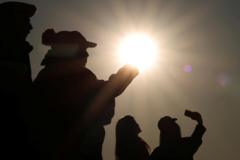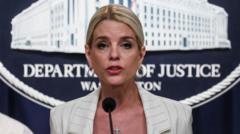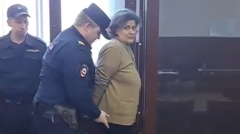On Friday, TikTok's fate hangs in the balance as the Supreme Court weighs the constitutionality of a potential ban, rooted in national security concerns and the protection of user rights.
TikTok Fights for Survival as Supreme Court Hearing Approaches

TikTok Fights for Survival as Supreme Court Hearing Approaches
TikTok's challenge against a US ban highlights the clash between national security and free speech
In a pivotal legal showdown, TikTok is set to plead before the US Supreme Court in a last-ditch effort to overturn a ban that could see the popular social media platform removed from US shores. The case is at the intersection of national security issues and the First Amendment, calling into question the balance between free speech rights for its 170 million American users and the government's concerns over foreign influence.
The controversy stems from legislation enacted last year, which mandates that TikTok be divested from its Chinese parent company, ByteDance, or face a complete shutdown by January 19. US government officials argue that from its Beijing headquarters, the Chinese government could exploit the app for espionage and political manipulation. In contrast, TikTok staunchly contests this assertion, claiming that it has been unjustly targeted and that the ban would significantly infringe upon users' free speech rights.
Despite previous rulings favoring the government, the involvement of President-elect Donald Trump has added complexity to the case. Trump recently called for the enforcement of the ban to be deferred, as he seeks potential negotiations to resolve the matter. Economic experts are left guessing on the verdict, noting that it would be unusual for the Supreme Court to overrule established precedents, especially in historically nuanced cases where governmental interest collides with constitutional freedoms.
The law received bipartisan legislative backing amid rising anxieties surrounding TikTok's rapid popularity, particularly among younger demographics known for creating viral content. Although the legislation does not outright ban the app, it would effectively dismantle its operations in the US by restricting tech giants like Apple and Google from offering TikTok or enabling updates. Several countries have already implemented similar bans, citing security concerns, including the UK and India.
The government's stance poses TikTok as a "grave" risk, claiming that user data could be captured by the Chinese government, thus filling a power vacuum to inaccurately shape public perception. A three-judge appeals court previously upheld the law, citing evidence of China's propensity to utilize private enterprises to pursue strategic interests.
TikTok has objected vehemently, asserting that the ban is rooted in flawed assumptions about its operational integrity. It has urged the Supreme Court to either invalidate the law or delay its implementation pending a comprehensive review of the legislation, which it deems to be based on unreliable information.
As the clock ticks, President-elect Trump’s administration looms over the legal controversy. After previously calling for a TikTok ban, Trump has shifted his position on the campaign trail, now advocating for negotiations rather than outright prohibition. His legal team's brief reflects a recognition of the intricate tensions between safeguarding national interests and upholding freedom of expression.
This inflection point for TikTok has ignited passionate pleas from users and advocacy groups, including the ACLU and Freedom of the Press Foundation. Opponents of the ban argue it would set a concerning precedent for open discourse in America.
As the legal battle unfolds, experts remain uncertain of the outcome, emphasizing the challenges of reconciling constitutional rights with perceived threats to national security. With the Supreme Court's decision likely to arrive within days, the outcome could have a lasting impact on TikTok's future in the United States.
The controversy stems from legislation enacted last year, which mandates that TikTok be divested from its Chinese parent company, ByteDance, or face a complete shutdown by January 19. US government officials argue that from its Beijing headquarters, the Chinese government could exploit the app for espionage and political manipulation. In contrast, TikTok staunchly contests this assertion, claiming that it has been unjustly targeted and that the ban would significantly infringe upon users' free speech rights.
Despite previous rulings favoring the government, the involvement of President-elect Donald Trump has added complexity to the case. Trump recently called for the enforcement of the ban to be deferred, as he seeks potential negotiations to resolve the matter. Economic experts are left guessing on the verdict, noting that it would be unusual for the Supreme Court to overrule established precedents, especially in historically nuanced cases where governmental interest collides with constitutional freedoms.
The law received bipartisan legislative backing amid rising anxieties surrounding TikTok's rapid popularity, particularly among younger demographics known for creating viral content. Although the legislation does not outright ban the app, it would effectively dismantle its operations in the US by restricting tech giants like Apple and Google from offering TikTok or enabling updates. Several countries have already implemented similar bans, citing security concerns, including the UK and India.
The government's stance poses TikTok as a "grave" risk, claiming that user data could be captured by the Chinese government, thus filling a power vacuum to inaccurately shape public perception. A three-judge appeals court previously upheld the law, citing evidence of China's propensity to utilize private enterprises to pursue strategic interests.
TikTok has objected vehemently, asserting that the ban is rooted in flawed assumptions about its operational integrity. It has urged the Supreme Court to either invalidate the law or delay its implementation pending a comprehensive review of the legislation, which it deems to be based on unreliable information.
As the clock ticks, President-elect Trump’s administration looms over the legal controversy. After previously calling for a TikTok ban, Trump has shifted his position on the campaign trail, now advocating for negotiations rather than outright prohibition. His legal team's brief reflects a recognition of the intricate tensions between safeguarding national interests and upholding freedom of expression.
This inflection point for TikTok has ignited passionate pleas from users and advocacy groups, including the ACLU and Freedom of the Press Foundation. Opponents of the ban argue it would set a concerning precedent for open discourse in America.
As the legal battle unfolds, experts remain uncertain of the outcome, emphasizing the challenges of reconciling constitutional rights with perceived threats to national security. With the Supreme Court's decision likely to arrive within days, the outcome could have a lasting impact on TikTok's future in the United States.




















